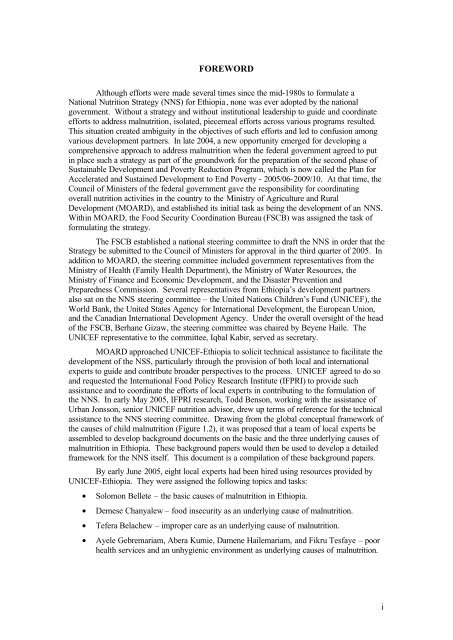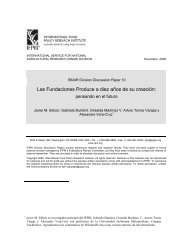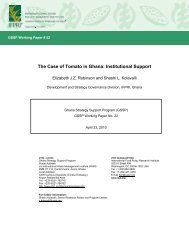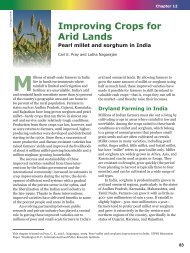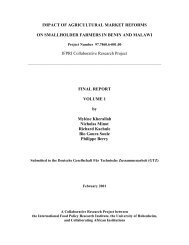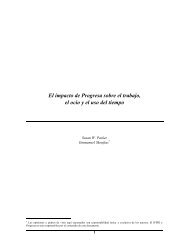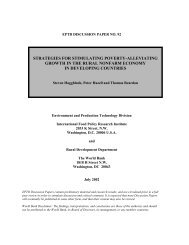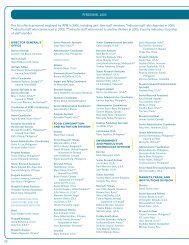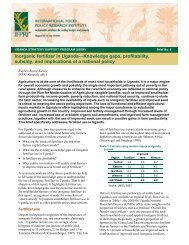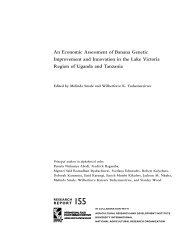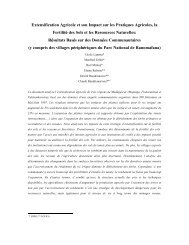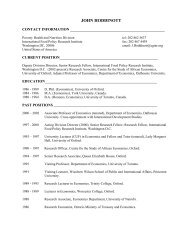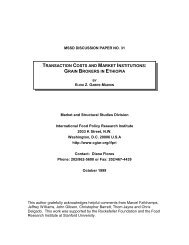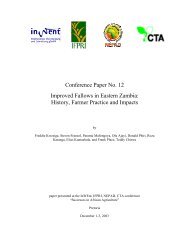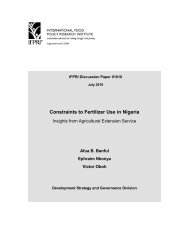An assessment of the causes of malnutrition in Ethiopia: A ...
An assessment of the causes of malnutrition in Ethiopia: A ...
An assessment of the causes of malnutrition in Ethiopia: A ...
Create successful ePaper yourself
Turn your PDF publications into a flip-book with our unique Google optimized e-Paper software.
FOREWORD<br />
Although efforts were made several times s<strong>in</strong>ce <strong>the</strong> mid-1980s to formulate a<br />
National Nutrition Strategy (NNS) for <strong>Ethiopia</strong> , none was ever adopted by <strong>the</strong> national<br />
government. Without a strategy and without <strong>in</strong>stitutional leadership to guide and coord<strong>in</strong>ate<br />
efforts to address <strong>malnutrition</strong>, isolated, piecemeal efforts across various programs resulted.<br />
This situation created ambiguity <strong>in</strong> <strong>the</strong> objectives <strong>of</strong> such efforts and led to confusion among<br />
various development partners. In late 2004, a new opportunity emerged for develop<strong>in</strong>g a<br />
comprehensive approach to address <strong>malnutrition</strong> when <strong>the</strong> federal government agreed to put<br />
<strong>in</strong> place such a strategy as part <strong>of</strong> <strong>the</strong> groundwork for <strong>the</strong> preparation <strong>of</strong> <strong>the</strong> second phase <strong>of</strong><br />
Susta<strong>in</strong>able Development and Poverty Reduction Program, which is now called <strong>the</strong> Plan for<br />
Accelerated and Susta<strong>in</strong>ed Development to End Poverty - 2005/06-2009/10. At that time, <strong>the</strong><br />
Council <strong>of</strong> M<strong>in</strong>isters <strong>of</strong> <strong>the</strong> federal government gave <strong>the</strong> responsibility for coord<strong>in</strong>at<strong>in</strong>g<br />
overall nutrition activities <strong>in</strong> <strong>the</strong> country to <strong>the</strong> M<strong>in</strong>istry <strong>of</strong> Agriculture and Rural<br />
Development (MOARD), and established its <strong>in</strong>itial task as be<strong>in</strong>g <strong>the</strong> development <strong>of</strong> an NNS.<br />
With<strong>in</strong> MOARD, <strong>the</strong> Food Security Coord<strong>in</strong>ation Bureau (FSCB) was assigned <strong>the</strong> task <strong>of</strong><br />
formulat<strong>in</strong>g <strong>the</strong> strategy.<br />
The FSCB established a national steer<strong>in</strong>g committee to draft <strong>the</strong> NNS <strong>in</strong> order that <strong>the</strong><br />
Strategy be submitted to <strong>the</strong> Council <strong>of</strong> M<strong>in</strong>isters for approval <strong>in</strong> <strong>the</strong> third quarter <strong>of</strong> 2005. In<br />
addition to MOARD, <strong>the</strong> steer<strong>in</strong>g committee <strong>in</strong>cluded government representatives from <strong>the</strong><br />
M<strong>in</strong>istry <strong>of</strong> Health (Family Health Department), <strong>the</strong> M<strong>in</strong>istry <strong>of</strong> Water Resources, <strong>the</strong><br />
M<strong>in</strong>istry <strong>of</strong> F<strong>in</strong>ance and Economic Development, and <strong>the</strong> Disaster Prevention and<br />
Preparedness Commission. Several representatives from <strong>Ethiopia</strong>’s development partners<br />
also sat on <strong>the</strong> NNS steer<strong>in</strong>g committee – <strong>the</strong> United Nations Children’s Fund (UNICEF), <strong>the</strong><br />
World Bank, <strong>the</strong> United States Agency for International Development, <strong>the</strong> European Union,<br />
and <strong>the</strong> Canadian International Development Agency. Under <strong>the</strong> overall oversight <strong>of</strong> <strong>the</strong> head<br />
<strong>of</strong> <strong>the</strong> FSCB, Berhane Gizaw, <strong>the</strong> steer<strong>in</strong>g committee was chaired by Beyene Haile. The<br />
UNICEF representative to <strong>the</strong> committee, Iqbal Kabir, served as secretary.<br />
MOARD approached UNICEF-<strong>Ethiopia</strong> to solicit technical assistance to facilitate <strong>the</strong><br />
development <strong>of</strong> <strong>the</strong> NSS, particularly through <strong>the</strong> provision <strong>of</strong> both local and <strong>in</strong>ternational<br />
experts to guide and contribute broader perspectives to <strong>the</strong> process. UNICEF agreed to do so<br />
and requested <strong>the</strong> International Food Policy Research Institute (IFPRI) to provide such<br />
assistance and to coord<strong>in</strong>ate <strong>the</strong> efforts <strong>of</strong> local experts <strong>in</strong> contribut<strong>in</strong>g to <strong>the</strong> formulation <strong>of</strong><br />
<strong>the</strong> NNS. In early May 2005, IFPRI research, Todd Benson, work<strong>in</strong>g with <strong>the</strong> assistance <strong>of</strong><br />
Urban Jonsson, senior UNICEF nutrition advisor, drew up terms <strong>of</strong> reference for <strong>the</strong> technical<br />
assistance to <strong>the</strong> NNS steer<strong>in</strong>g committee. Draw<strong>in</strong>g from <strong>the</strong> global conceptual framework <strong>of</strong><br />
<strong>the</strong> <strong>causes</strong> <strong>of</strong> child <strong>malnutrition</strong> (Figure 1.2), it was proposed that a team <strong>of</strong> local experts be<br />
assembled to develop background documents on <strong>the</strong> basic and <strong>the</strong> three underly<strong>in</strong>g <strong>causes</strong> <strong>of</strong><br />
<strong>malnutrition</strong> <strong>in</strong> <strong>Ethiopia</strong>. These background papers would <strong>the</strong>n be used to develop a detailed<br />
framework for <strong>the</strong> NNS itself. This document is a compilation <strong>of</strong> <strong>the</strong>se background papers.<br />
By early June 2005, eight local experts had been hired us<strong>in</strong>g resources provided by<br />
UNICEF-<strong>Ethiopia</strong>. They were assigned <strong>the</strong> follow<strong>in</strong>g topics and tasks:<br />
• Solomon Bellete – <strong>the</strong> basic <strong>causes</strong> <strong>of</strong> <strong>malnutrition</strong> <strong>in</strong> <strong>Ethiopia</strong>.<br />
• Demese Chanyalew – food <strong>in</strong>security as an underly<strong>in</strong>g cause <strong>of</strong> <strong>malnutrition</strong>.<br />
• Tefera Belachew – improper care as an underly<strong>in</strong>g cause <strong>of</strong> <strong>malnutrition</strong>.<br />
• Ayele Gebremariam, Abera Kumie, Damene Hailemariam, and Fikru Tesfaye – poor<br />
health services and an unhygienic environment as underly<strong>in</strong>g <strong>causes</strong> <strong>of</strong> <strong>malnutrition</strong>.<br />
i


